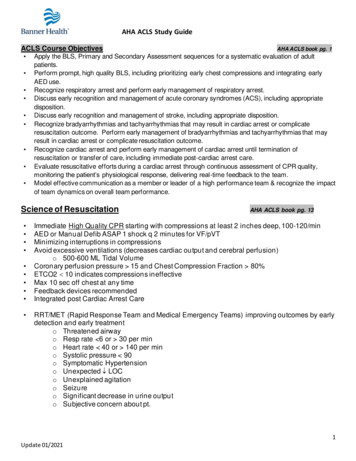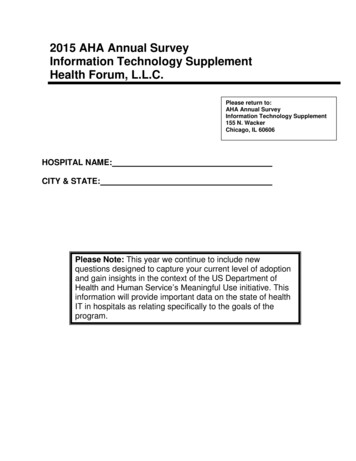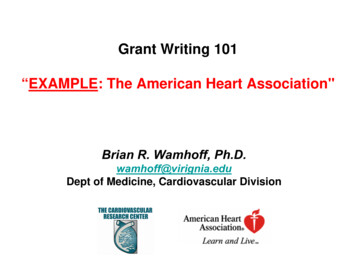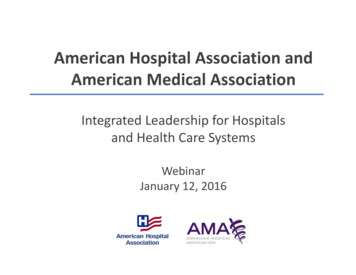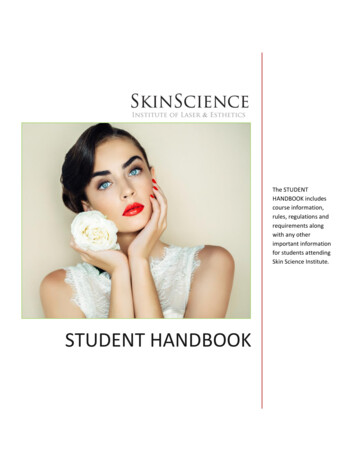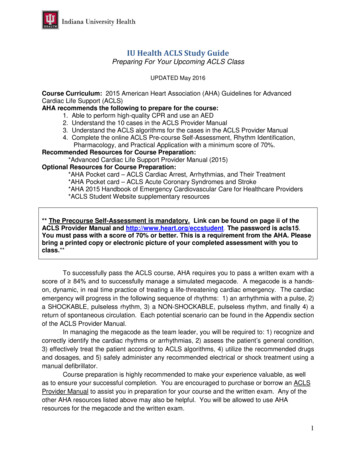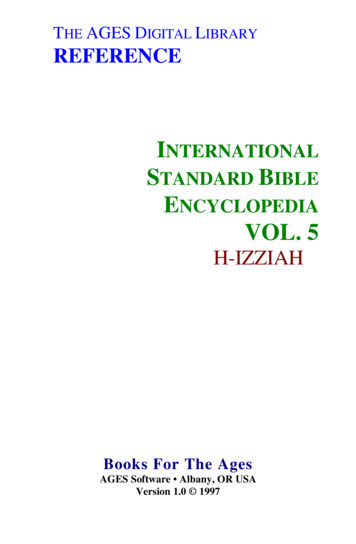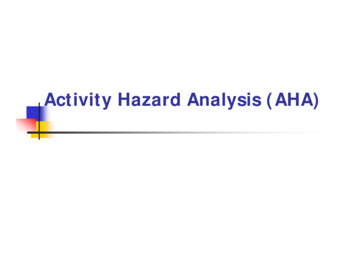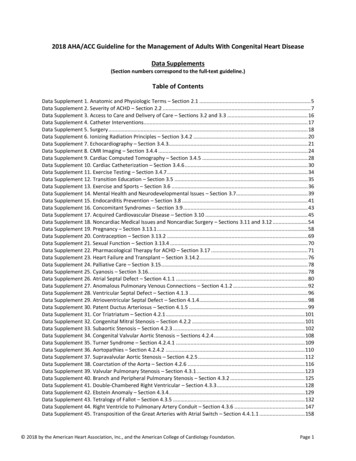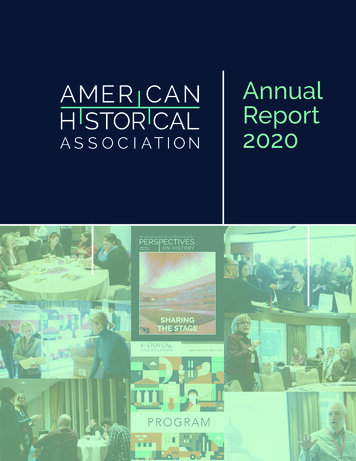
Transcription
AnnualReport2020
Table of ContentsCouncil Decisions and Actions . 2Officers’ Reports. 8Professional Division Report . 9Research Division Report . 11Teaching Division Report . 13American Historical Review Report . 16AHR Editor’s Report . 17AHR Publisher’s Report . 33Committee Reports . 40Committee on Affiliated Societies Report . 41Committee on Gender Equity Report . 43Committee on LGBTQ Status in the Profession Report . 44Committee on Minority Historians Report . 46Graduate and Early Career Committee Report . 47Pacific Coast Branch Report . 49National History Center Report . 51Council, Division, and Committee Members . 55Awards, Prizes, Fellowships, and Grants. 62Awards and Prizes . 63Fellowships and Grants . 67Members. 7125-Year Members of the American Historical Association . 7250-Year Members of the American Historical Association . 73Life Members of the American Historical Association . 78Donors to the American Historical Association . 81Financial Statements with Independent Auditor’s Report . 881 PageAHA Annual Report 2020
Council Decisions and ActionsCouncil Decisions and ActionsAt meetings on January 3 and 6, 2020, the Council of the American Historical Association tookthe following actions: Approved the terms of discussion for the 2020 AHA Business Meeting.Approved the minutes of the June 2019 Council meeting.Approved the interim minutes of the Council from June through December 2019.Approved the 2020 Committee appointments.Approved the Statement on Research Access.Approved revisions to the penultimate paragraph in the Association’s “GuidingPrinciples on Taking a Public Stance” regarding amicus briefs and adopted Policies andProcedures for Considering Amicus Brief Requests.Approved “Improving the Status of Non-Tenured-Tenure-Track Faculty:Recommendations for History Departments.”Approved extending eligibility for the AHA Council Annual Meeting Travel Grants toUn/Underemployed historians beginning with the 2021 annual meeting.Selected the 2020 Honorary Foreign Member [Name to be released in Fall 2020].Appointed Mark Ravina, University of Texas at Austin, chair, and Margaret SalazarPorzio, National Museum of American History, co-chair of the 2022 Program Committee.Approved changes to AHA Bylaws (4) Pursuant to Article IV, Section 6 to extend thesearch process for the AHR editor from 18 months to 24 months, and to expand thesearch committee from four to five members.Approved a proposal by the AHA Committee on LGBTQ Status in the Profession to createa spend-down fund to provide an annual 500 grant to support research in LGBTQhistory. The committee agreed to raise the 12,500 to fund the grant until the accountis depleted.Approved changes to the Annual Meeting Guidelines to clarify when advisors andstudents may appear on the same session, to clarify the process for sessions organizedby AHA divisions and committees, and to clarify that presentations in languages otherthan English are permissible, with certain conditions.Referred the Resolution Condemning Affiliations between ICE and Higher Education,which was adopted by a majority of the members present at the AHA Business meeting,to the AHA’s general counsel for a legal opinion as specified in Article 7 of the AHA’sConstitution. Council will veto the resolution if it requires the Association to supportactivities that violate federal, state, or local laws. If the resolution does indeed requirethat the AHA support such activities (and hence a veto), Council will consider at its June2 PageAHA Annual Report 2020
2020 meeting a new resolution on the issues raised in the petition that would conformwith legal requirements and the mission of the AHA.Established an ad hoc committee to revisit the AHA’s Constitution and Bylaws.Received the Fiscal Year 2018-19 Audit.Through email conversation from January 10, 2020, to May 30, 2020, the Council of theAmerican Historical Association took the following actions: Reappointed Kenneth Ledford for a three-year term as AHA Parliamentarian.Approves a Statement Condemning the Use of Historical Sites in Warfare.Sent a letter to Russell Vought, acting director of the Office of Management and Budget,and members of the Public Buildings Reform Board, expressing concern about therecommendation for the closure and sale of the National Archives and RecordsAdministration (NARA) facility in Seattle.Sent a letter to David Ferriero, Archivist of the United States, voicing concern about theNARA policy that directs all agencies to manage all permanent records electronically byDecember 2022 and arguing that hasty implementation of the policy, with a lack ofdedicated funding, will impair NARA's mission and have dire consequences forresearchers.Sent a letter to French President Emmanuel Macron, expressing concern that thechange in policy to declassify documents at Vincennes and other repositories in Francehas rendered many documents inaccessible and encouraging the development of aclear, efficient, and effective procedure for declassification.Signed onto a letter to the Committee on Rules of Practice and Procedure of the UnitedStates Courts proposing a revision to Rule 6(e) to specify that the courts can releasegrand jury records based on historical significance.Sent a letter to the Executive Office of Immigration Review (EOIR) expressing concernover reports that EOIR had omitted close to 1,000,000 records from its September 2019anonymized data release.Approved joining the Citizens for Responsibility and Ethics in Washington (CREW) andthe Society for Historians of American Foreign Relations (SHAFR) in a lawsuit against theNational Archives and Records Administration (NARA) and US Immigration and CustomsEnforcement (ICE), challenging NARA’s decision to approve ICE’s records dispositionschedule for Detainee Records, which authorizes ICE to destroy records documentingmistreatment of immigrants detained in ICE custody.Signed onto a statement from the American Sociological Association regarding facultyreview and reappointment processes during the COVID-19 crisis. The statementencourages institutions of higher education to consider appropriate temporaryadjustments to their review and reappointment processes for tenured and contingentfaculty, including adjusting expectations for faculty scholarship, limiting the use ofstudent evaluations of teaching, and extending tenure timelines. The AHA also urged allhigher education institutions that employ contract and/or part-time faculty tocompensate fully for courses already contracted for summer and fall offerings.3 PageAHA Annual Report 2020
Sent a letter to Tristan Denley, executive vice chancellor and chief academic officer forthe University System of Georgia and chair of the General Education RedesignImplementation Committee, opposing proposed changes to the general educationcurriculum. The letter asserts that the legislative requirement for instruction in thehistory and government of the United States and Georgia cannot be fulfilled by takingonly one course, either in history or political science, and that proper instruction inhistory can be fulfilled only by trained historians.Approved a statement endorsed by dozens of peer organizations emphasizing theimportance of historical thinking in understanding the current crisis and urges allinstitutions that employ historians to be flexible and humane in considering the needs oftheir employees and constituencies.Approved signing onto a letter to Congressional leaders in appreciation for theCoronavirus Aid, Relief, and Economic Security (CARES) Act and encouraging theprovision of substantial additional funding for higher education in future bills, with focuson those students and institutions hardest hit by the consequences of the pandemic.At meetings on June 1-5, 2020, the Council of the American Historical Association took thefollowing actions: Approved the minutes of the January 2020 Council meetings.Approved the interim minutes of the Council from January through May 2020.Approved the following 2022 Program Committee appointments: Cemil Aydin (Univ. ofNorth Carolina, Chapel Hill), Joseph Bangura (Kalamazoo Coll.), Choi Chatterjee(California State Univ., Los Angeles), José Carlos de la Puente (Texas State Univ.), GerardJ. Fitzgerald (independent scholar), Beth Hyde (Kean Univ.), Jonathan Lee (San AntonioColl.), Jenny Hale Pulsipher (Brigham Young Univ.), Heather Cox Richardson (BostonColl.), Haimanti Roy (Univ. of Dayton), Kristin Tassin (Episcopal School of Acadiana), andHugh Thomas (Univ. of Miami).Approved signing onto the potential amicus brief Ahmad v. University of Michiganregarding upholding the standard archival practice of a period of closure for the papersof a private individual donated to public, university-based archives.Vetoed the “Resolution Condemning Affiliations Between ICE and Higher Education,”which had passed at the Association’s January 2020 business meeting, on the groundsthat the resolution called for actions that would violate the law.Approved a substitute “Resolution on Affiliations between ICE and Higher Education.”Approved the nominations for the 2020 Awards for Scholarly Distinction (names to bereleased at a later date).Approved a Statement on the History of Racist Violence in the United States.Approved updating Section 3.a of the Annual Meeting Guidelines to include “Affiliatesessions should reflect the diversity guidelines outlined in section 4.2.d and e.”Approved the FY21 Operating and Capital Budgets on the basis that it would not bepossible to hold an annual meeting in Seattle in January 2021.Appointed the following historians to the Board of Editors for the American HistoricalReview for three-year terms to begin August 2020: Abou Bamba, Gettysburg Coll.4 PageAHA Annual Report 2020
(African); Keisha Blain, Univ. of Pittsburgh (Modern US); Angela Vergara, California StateUniv., Los Angeles (Caribbean/Latin American); and Merry Weisner-Hanks, Univ. ofWisconsin, Milwaukee (Early Modern Europe.Appointed the following historians as Associate Review Editors for the AmericanHistorical Review for three-year terms to begin August 2020: Alison Beach, St. AndrewsUniv. (Medieval); Monica Black, Univ. of Tennessee (Modern European, Nazism,Germany); Brandon Byrd, Vanderbilt Univ. (US since 1860, Haiti, African American);Adeeb Khalid, Carleton Coll. (Russian, Soviet, Central Asian, Islam); and DonnaPatterson, Delaware State Univ. (African, medical).Approved changes to the AHA Bylaws 4(2)a to allow for two reviews during an editor’sfive-year term—one at 18 months, and one at 36 months.Appointed Mark Bradley (Univ. of Chicago) as editor of the American Historical Review,to begin a 5-year term in August 2021.Approved revisions to AHA Bylaws 12(4)a and 12(4)b, which indicate that resolutions forconsideration at the AHA business meeting must be signed by at least two percent (2%)of the total Association membership as of the end of the previous fiscal year and thatresolutions should adhere to the Association’s Guiding Principles on Taking a PublicStance.Approved changes to Article VII, Sections 3 and 4 of the AHA Constitution relating to theBusiness Meeting, which include providing AHA Council the option to send any“measures adopted by the business meeting” to the “AHA membership for areferendum” (Section 3) and adding that Council may veto any measure adopted at thebusiness meeting that it believes “ does not adhere to the Guiding Principles on Takinga Public Stance.” In accordance with the AHA Constitution, the changes will require afull vote and approval of the AHA membership during its next election in June 2021 totake effect.Through email communications from June 17, 2020, through December 23, 2020, the Council ofthe American Historical Association took the following actions: Approved endorsing a Congressional resolution recognizing the 1921 Tulsa RaceMassacre, introduced by Sen. Elizabeth Warren (D-MA).Established the Historians Relief Fund to provide 500 emergency grants forun/underemployed historians who have been financially affected by the COVID-19pandemic.Sent a letter to the US Immigration and Customs Enforcement strongly objecting to“modifications” declaring that foreign “students attending schools operating entirelyonline may not take a full online course load and remain in the United States.”Signed onto a Statement on the 2020 Hong Kong National Security Law initiated by theAssociation for Asian Studies, which expressed deep concern over the PRC government’snew security legislation that severely curtails the freedoms guaranteed in Hong Kong’sBasic Law, the Sino-British Joint Declaration, and the International Covenant on Civil andPolitical Rights.5 PageAHA Annual Report 2020
Approved the Statement on Historical Research During COVID-19.Appointed Mark Bradley (Univ. of Chicago) to serve a five-year term as editor of theAmerican Historical Review beginning August 2021.Approved a Statement on Department Closures and Faculty Firings, which recognizesthe economic implications of the COVID-19 pandemic and resulting decline in highereducation revenues, but asserts that the AHA has, and will continue to, assist historydepartments in making the case for the imperative of historical learning and thinking inhigher education.Endorsed a joint statement authored by the American Council of Learned Societies onCOVID-19 and the Key Role of the Humanities and Social Sciences in the United States,which called on all leaders of institutions of higher education to uphold the centralimportance of the humanities and social sciences when making important decisionsabout the future of their institutions.Established, with an endowment gift from the Agentives Fund, two new prizes in honorof the late Congressman John Lewis: the John Lewis Award for Public Service to theDiscipline of History, awarded to a non-historian, which would replace the existingRoosevelt-Wilson Award, and the John Lewis Award for History and Social Justice,awarded to a historian.Sent a letter to the Québec Ministry of Culture in regards to the Séminaire de SaintSulpice archive and library in Montréal, expressing “grave concern for the futurepreservation, maintenance, and accessibility” of the historically significant archives andcollections at Saint-Sulpice, following the recent termination of the professional staffcharged with overseeing these collections.Sent a letter of support for the Smithsonian American Women's History Museum Act (S.959), which was introduced by Senators Susan Collins (R-ME) and Dianne Feinstein (DCA).Appointed Pablo Gomez (Univ. of Wisconsin, Madison) to the 2022 Program Committeeto fill a recent vacancy on the Committee.Approved a statement on the “White House Conference on American History” deploringthe tendentious use of history and history education to stoke politically motivatedculture wars.Signed onto two comments posted to the National Archives and Records Commissionwebsite in response to a proposed records schedule that would classify a set of Customsand Border Patrol records as "temporary," which would allow their destruction within asquickly as four years.Approved a statement on the “Executive Order Prohibiting the Inclusion of “DivisiveConcepts” in Employee Training Sessions,” calling for a retraction of the order, statingthat it was “neither necessary nor useful.”Approved the revised FY21 budget.Approved a letter to the Chair of the Supreme Court of Karelia on behalf of YuriDmitriev, a Russian local historian exploring crimes of the Stalin era, sentenced to 13years in prison based on unsubstantiated charges.6 PageAHA Annual Report 2020
Sent a letter to the president of Collin College on behalf of AHA member Dr. LoraBurnett, requesting that the college respect "the right of historians to express theiropinions as private citizens without fear of institutional discipline."Approved a statement expressing concern regarding changes in French policy on thedeclassification of documents from 1940 to 1970.Sent a letter to the US Senate Subcommittee on Financial Services and GeneralGovernment requesting that the subcommittee reconsider its vote to eliminate fundingfor the National Historical Publications and Records Commission.Sent a letter to the president and trustees of Guilford College, urging them to reconsiderthe elimination of the history program and termination of one tenure-track and twotenured history faculty members.Sent a letter to the Arkansas Division of Higher Education expressing concern about alegislative request to academic units in the Arkansas university system seeking to collectdata on the teaching of ‘’The 1619 Project’’ and ‘’Critical Race Theory’’ at public highereducation institutions in Arkansas.Approved joining the National Security Archive, the Society for Historians of AmericanForeign Relations, and Citizens for Responsibility and Ethics in Washington as plaintiffsin a lawsuit intended to prevent valuable presidential records from being irretrievablylost. The plaintiffs seek to ensure that the current administration and the NationalArchives comply with the charge of the Presidential Records Act to preserve "completecopies" of presidential records, including relevant metadata of digital materials.Endorsed the Educating for Democracy Act of 2020, which would provide 1 billion peryear for the next five fiscal years to improve the teaching of history and civics in ournation’s schools.Approved AHA participation as a co-plaintiff in a lawsuit filed by Washington StateAttorney General Ben Ferguson to prevent the federal government’s “unlawful andprocedurally improper” sale of the National Archives and Records Administration’s(NARA) facility in Seattle, expected in early 2021.Approved a letter to the chancellor and provost at the University of Mississippiexpressing concern about the University’s decision not to renew the contract of GarrettFelber, assistant professor of history, noting the possibility that Professor Felber’stermination might have related to his activism regarding racism and incarceration.Submitted a comment in support of a campaign to enable commenting on footnotes inMicrosoft Word using the Review function and encouraged AHA members to comment.7 PageAHA Annual Report 2020
Officers’ ReportsProfessional Division ReportResearch Division ReportTeaching Division Report8 PageAHA Annual Report 2020
Professional Division ReportRita Chin, University of MichiganVice President, Professional DivisionThe 2020 Professional Division (PD) consisted of four members: Mary Elliott (National History ofAfrican American History and Culture), Reginald Ellis (Florida A&M), Nerina Rustomji (St. John’sUniversity), and myself as vice-president. The work of the division depends upon theextraordinary support of Executive Director Jim Grossman and AHA staff members LauraAnsley, Megan Connor, Debbie Ann Doyle, Dylan Ruediger, Emily Swafford, Liz Townsend,Sarah Weicksel, Jeremy Young, and Dana Schaffer. We cannot overstate our appreciation forthe staff’s professionalism, expertise, and good humor, especially under the difficultcircumstances of the COVID pandemic. Thank you all – with particular thanks to Emily for herexemplary guidance on all matters PD.The division’s principal responsibility is to monitor all areas of professional work within thediscipline and to develop advisory materials to assist historians at various stages of theircareers. The division also addresses issues related to the training, employment, responsibilities,and working conditions of historians and responds to informal queries from AHA membersseeking advice on workplace and other practices. We are not an investigatory body, andtherefore usually refer enquiries to the AHA’s Statement on Standards of Professional Conduct,available on the Association’s web site, as well as to guidelines produced by other pertinentorganizations. In 2020, PD received three formal inquiries about professional matters. Two ofthem dealt with plagiarism, the other with letters of evaluation for tenure and promotion. Oneof the plagiarism cases involved accusations made via email and social media and involved PDworking with the Executive Director to provide guidance to a department chair embroiled in thesituation. The third query requested guidance on how historians should deal with requests forevaluative letters coming from institutions subject to state open records laws.As the year began, PD expected to focus its work on two main areas: 1) building on the effortsof the Non-Tenure-Track Faculty Ad Hoc Committee by strategizing ways to extend the reach ofthe AHA Recommendations Statement for Improving the Status of Non-Tenure-Track Faculty;and 2) designing support mechanisms for historians at the mid-career stage. At its Marchmeeting, PD discussed plans to implement a workshop on second research/book projects, aswell as to develop panels for the annual meeting on the mid-career stage (including issuesspecific to faculty at HBCUs and minority-serving institutions). With the Council decision tocancel the in-person annual meeting that had been scheduled to take place in Seattle, however,all of these plans were put on hold.Instead, PD pivoted to addressing the impact of COVID-19 on historians more generally, whichinvolved a number of different initiatives: a divisional proposal to draft a PD columnfor Perspectives on the impacts of the pandemic on non-tenure-track faculty (May); EmilySwafford’s transformation of the Chairs Workshop into a webinar series (summer); hosting aconversation for history department leaders on graduate admissions in the context of the9 PageAHA Annual Report 2020
pandemic (mid-October); and divisional discussions of how the AHA could continue to supporthistorians in tenure-track job market that has been decimated by the pandemic and in themidst of general economic decline (late October).PD’s other major work this year has been on behalf of several important ongoing AHAinitiatives. It continued to offer its support to the Association’s exciting Career Diversityprogram. In an effort to ascertain the impact of this work, the AHA plans to conduct a census ofhistory departments across the country and revised the survey instrument from 2000 to includedetailed questions about career and professional development. It is also developing a virtualCareer Diversity Faculty Institute to expand the number of history departments participating inthe initiative. PD is supporting both projects.In January Mary Elliott will be cycling off the Professional Division. On behalf of the entireCouncil, I would like to thank Mary for her keen insights, frank comments, and importantcontributions over the past three years. PD has continually benefited from her professionalismand her always thoughtful approach to the issues the division has faced.Finally, I would like to extend a warm welcome to Simon Finger, College of New Jersey, who willbe joining PD as Councilor in January.10 P a g eAHA Annual Report 2020
Research Division ReportSophia Rosenfeld, University of PennsylvaniaVice President, Research DivisionAmerican Historical ReviewOne of the main activities of the Research Division in 2020 was to complete the search for anew editor for the American Historical Review (AHR) to begin a five-year term in summer 2021.To that end, the VP for Research chaired an ad hoc search committee that interviewed six semifinalists via Zoom in January 2020, invited four to Washington for in-person interviews in earlyMarch, determined first- and second-choice candidates to propose to Council in June, andfinally completed the search with the announcement in July 2020 that our first-choicecandidate, Mark Bradley (University of Chicago), would follow Alex Lichtenstein as the firsteditor of the journal to be employed outside of Indiana University, where the journal’sheadquarters remain.With the support of the Research Division, substantial changes were made this year to thejournal’s internal structure and staffing, including the naming of Nathan Draluck to the newposition of managing editor and the outsourcing of some copyediting responsibilities. Changeswere also made to the journal’s editorial and review processes, including the turn to an onlinemanagement system (ScholarOne) that fortuitously also helped make remote working possiblefor the journal’s staff for most of 2020. The journal will also go from five to four issues per year,starting in 2021.The Research Division, working with a strong list of suggestions from AHR editor AlexLichtenstein, recommended to Council slates of candidates for six vacant positions on theAHR’s Board of Editors (BOE) and five new positions for Associate Review Editors (ARE), whowill be focused on the AHR book review process.The bylaws governing the timetable for the review of the AHR’s editor were amended this yearby Council, on recommendation from the Research Division. Rather than conduct annualreviews of the editor, which were thought by all parties to be excessive in terms of theirfrequency, the Research Division will henceforth review the editor after his/her first 18 monthsat the helm and again at 36 months.The VP of the Research Division also played a consultative role a) in aiding the currentAHR editor in dealing with controversies as they arose and b) over the past six months, inadvising the incoming AHR editor as he began to consider changes to the journal’s collection ofconsultative editors and redesign for the coming year.Research AccessDiscussions on questions of research access with the Mellon Foundation and the Center forResearch Libraries are continuing. The Research Division is hopeful that these conversationswill ultimately result in increasing access to library materials for scholars who lack professional11 P a g eAHA Annual Report 2020
access to full scholarly/academic library resources. This is even more imperative in the contextof COVID-19.Letters, Briefs, Statements, and WebinarsThe Research Division was involved in drafting letters and supporting amicus briefs that werethen brought to Council for final approval. These included a brief supporting the position of theBentley Library at the University of Michigan regarding the importance of honoring FLIArestrictions attached to donated collections; a letter to the Québec Ministry of Cultureregarding the impact on scholars of the closing of the Séminaire de Saint-Sulpice archive andlibrary; a letter denouncing the sentencing in Russia of scholar Yuri Dmitriev for work exploringcrimes of the Stalin era; and two letters to the French government regarding the impact of newregulations on the declassification of pre-1970 government documents marked “secret.”The Research Division also prepared for Council’s approval a Statement on Historical Researchduring COVID-19 urging university administrations to make accommodations for students andfaculty whose ability to undertake or finish their research projects has been negativelyimpacted by the virus. The Research Division is currently working on a Statement on CoAuthorship/Collaborative Research that will be presented to Council for approval in January2021.The Statement on Historical Research during COVID-19 was also the subject of a wellattended webinar, entitled “Doing Research During Covid-19” and moderated by Sara Georgini,in fall 2020.OtherFinally, the Research Division has organized several panels, workshops, and
3 P a g e A H A A n n u a l R e p o r t 2 0 20 2020 meeting a new resolution on the issues raised in the petition that would conform with legal requirements and the mission of the AHA. Established an ad hoc committee to revisit the AHA [s onstitution and Bylaws. Received the Fiscal Year 2018-19 Audit. Through email conversation from January 10, 2020, to May 30, 2020, the Council of the
